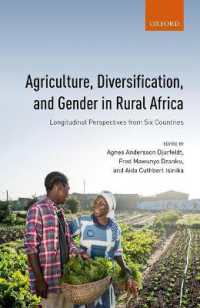- ホーム
- > 洋書
- > 英文書
- > Business / Economics
Full Description
An increase in the global population has led to a higher demand for food, besides complicating environmental, economic, and social issues. Agricultural industries across the world have adopted modern technologies to boost yields, but these methods frequently cause environmental harm due to the use of chemical fertilizers, pesticides and insecticides. While the 'green revolution' has enhanced food security for numerous regions, it has also worsened the qualities of the environmental assets.
Sustainable Agricultural Practices: Economic and Environmental Implications presents a comprehensive exploration of contemporary challenges and innovative solutions in agriculture. From analysing the impact of total factor productivity (TFP) on environmental sustainability to investigating trade relationships among BIMSTEC countries (India, Bhutan, Bangladesh, Myanmar, Thailand, Nepal, Sri Lanka), this collected edition delves into some of the most important agricultural questions today. Chapters cover diverse topics such as food waste, unemployment and flood response in Bangladesh, as well as the implications of agricultural growth on food security in India and Pakistan. With contributions from scholars worldwide, this collection offers valuable insights into the intricate nexus between agricultural, environmental and socio-economic dynamics, fostering informed policies and practices for a sustainable future.
This comprehensive collection provides insights for researchers and academics in agriculture and environmental studies. Policy makers and government officials, as well as international development practitioners, may also reap benefits from the analysis of food security issues, environmental health and socioeconomic development.
Contents
Foreword; Enrico Ivaldi
Section A. Economic Implications of Agricultural Practices in Countries and Groups
Chapter 1. Economic and Environmental Implications to Sustainable Agricultural Practices: Insights from the Covered Studies; Ramesh Chandra Das
Chapter 2. Change in Productivity of Cereals Cropping and Trade Relationship among BIMSTEC Countries; Subhrabaran Das and Kiran Bhowmik
Chapter 3. Natural Resource Evaluation and Climate Change: Analysis of Indian Sundarbans; Nilendu Chatterjee and Tonmoy Chatterjee
Chapter 4. An Analysis of the Price Behaviour of Agricultural Commodities in India; Debraj Das and Debabrata Mukhopadhyay
Chapter 5. The Role of Institutional Credit in the Development of the Agricultural Sector: An Empirical Study on India; Sagnik Maity and Amit Majumder
Chapter 6. A comprehensive sustainable entrepreneurship model for changing the dynamics of the market of fertilizers in México during the pandemic crisis; José G. Vargas-Hernández and M. C. Omar C. Vargas-González
Chapter 7. Are the rich countries in terms of aggregate and agricultural activities responsible for food waste? Insights from some selected countries; Buddhadev De and Ramesh Chandra Das
Chapter 8. The Anchor Borrowers' Programme and its Influence on Rice Farming Dynamics in Ebonyi State, Nigeria; Obinna S. Chima, Moses M. Duruji, Daniel E. Gberevbie, and Ugochukwu D. Abasilim
Chapter 9. Zero Budget Farming and Export Competitiveness of Agricultural Sector in LDCs: An Introspection with Reference to India; Debashis Mazumdar and Mainak Bhattacharjee
Section B. Environmental Insinuations of Agricultural Practices across Countries and Groups
Chapter 10. Determining the most appropriate strategy for reducing greenhouse gas emissions caused by the agriculture sector using DEMATEL; Serkan Eti, İrfan Ersin, Yaşar Gökalp, Çağatay Çağlayan, and Duygu Yavuz
Chapter 11. Sustainable Agricultural Exercises: A Promising Way to Understate Environmental Degradation; Subhabrata Ghosh and Krishna Singh
Chapter 12. Assessing the Relationship between Crop Production, Livestock Production, and CO2 Emissions: A Panel Cointegration Analysis; Ujjal Protim Dutta and Aliul Islam
Chapter 13. Agricultural Production by Sector, Convergence and Environmental Sustainability; Ebikabowei Biedomo Aduku
Chapter 14. Ways for Enhancing Contribution of Architecture Engineering and Construction Industry and its Professionals to Food Security and Sustainable and Resilient Agricultural Practices; Begum Sertyesilisik
Chapter 15. Technical Efficiency, Small Pond Fishery and Sustainability: Evidence from a Stochastic Frontier Regression Approach with Reference to West Bengal, India; Kishan Agarwalla and Tonmoy Chatterjee
Chapter 16. Food Security and Safety in Bangladesh: Implications of Environmental Health; Md. Juel Mia, Md. Shihabul Hossain, Shamima Prodhan, and Md. Saifullah Akon






